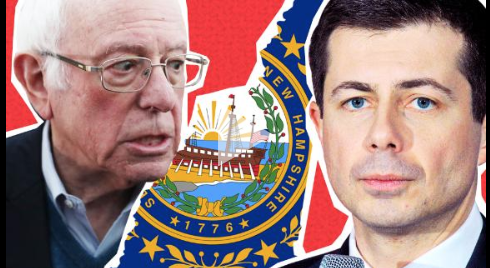Predicting the 5 most likely New Hampshire scenarios

After a disastrous Iowa caucus, people are asking why New Hampshire gets to be the first in the nation for primary season. Chris Cillizza explains the history into why this tiny state votes first.
February 10, 2020
(CNN) — Every Sunday, I outline the 5 BIG 2020 storylines you need to know to understand the upcoming week on the campaign trail. This week, with the New Hampshire primary set for Tuesday, I’ve laid out the five most likely scenarios in the Democratic primary.
5. Klobuchar surprises for third or close fourth: The Minnesota senator had a terrific debate on Friday night, with a closing message on the need for a return to empathy in our politics and our country that was incredibly powerful.
Her performance has fueled a fundraising surge ($2+ million raised in the 14 hours after the debate!) which often, but not always, coincides with a polling surge, too.
To date, the daily tracking poll in New Hampshire hasn’t picked up that sort of movement. But Klobuchar still has 48 hours to make something happen.
And to be clear, she needs something to happen. If Klobuchar is relegated to fifth place (as she was in Iowa), it’s very hard to see how she keeps going in the race.
4. Warren runs a distant third: The buzz for Massachusetts Sen. Elizabeth Warren’s presidential campaign since her solid-but-not-surprising third place finish in the Iowa caucuses has been nonexistent.
And Warren’s numbers in New Hampshire, where she was once considered a co-favorite with Bernie Sanders thanks to their geographic closeness, seem stuck in neutral, too.
Warren, at the moment, looks on course to finish a distant third behind Vermont Sen. Bernie Sanders and former South Bend, Indiana, Pete Buttigieg (in some order). That’s not good enough for a candidate who hasn’t demonstrated much appeal among non-white voters, with the primary/caucus process shifting to much more diverse electorates in Nevada and South Carolina.
If Warren comes in third, there will be calls for her to get out and endorse Sanders — thereby uniting liberals behind a single candidate. (Those calls will be even louder if Buttigieg beats Sanders). Will Warren listen?
3. Biden (badly) underwhelms: Look, when the first thing you say at a debate four days before the New Hampshire primary is “I’ll probably take a hit here,” you can’t feel too good about your standing in the state.
Polling released since the former vice president’s fourth-place finish in the Iowa caucuses suggests he is trending downward in the Granite State, too. In fact, in the five most recent New Hampshire polls, Joe Biden gets no more than 13% and is in either third or fourth place.
If Biden finishes behind Sanders, Buttigieg and Warren for the second time in eight days, there will begin to be calls for him to leave the race. Biden will likely ignore those calls, forging ahead to the more diverse electorates in Nevada (February 22) and South Carolina (February 29).
But his money, which was already dwindling, will dry up entirely — and the narrative around him will be one of decline. It’s very hard to come back from that, no matter what the electorate looks like.
2. Buttigieg wins: Even though Iowa Democrats totally bungled the caucuses, it’s now clear that the former mayor emerged from the vote with real momentum.
A CNN-University of New Hampshire poll released Saturday showed Buttigieg at 21%, up from 15% in a similar poll conducted last month. Other data shows a similar swell of support.
Buttigieg doesn’t need to win New Hampshire to keep that momentum going — a closer-than-expected second-place finish to Sanders wouldn’t hurt. But a win might just do the trick in terms of beginning to move Buttigieg’s stagnant numbers among black and Hispanic voters in Nevada and South Carolina.
Without that movement, Buttigieg won’t be the nominee — no matter what happened in Iowa and will happen in New Hampshire. But Buttigieg is doing everything he can to put himself in a place to solve that problem.
1. Bernie wins: Remember that Sanders crushed Hillary Clinton in the 2016 New Hampshire primary by 22 points. And that he is from neighboring Vermont. And that virtually every credible poll conducted since Iowa (and even before the caucuses) showed Sanders with a lead.
When you add all that up, it’s hard to see anything less than a first-place finish for Sanders as a real win here. Lucky for the Vermont senator (and his supporters), he is still the favorite, despite clear momentum from Buttigieg after Iowa.
While Sanders would likely prefer a wide victory like he won four years ago, that seems unlikely. And a win, at this point, is a win.
The-CNN-Wire
™ & © 2020 Cable News Network, Inc., a WarnerMedia Company. All rights reserved.











